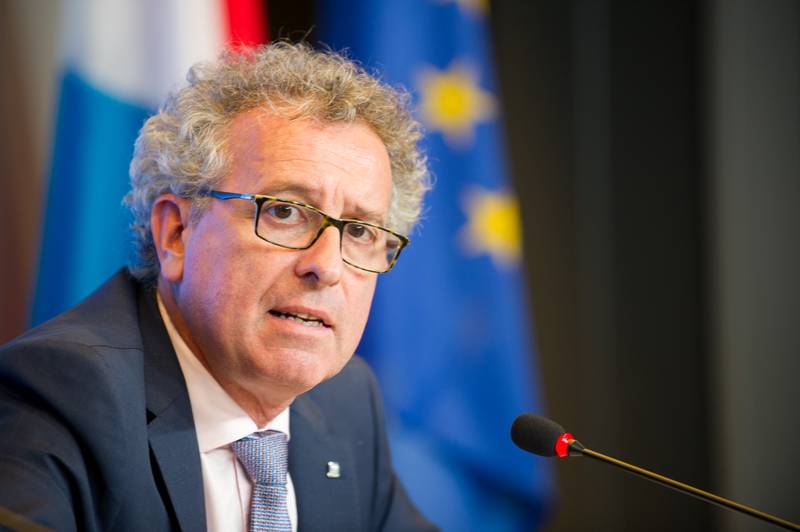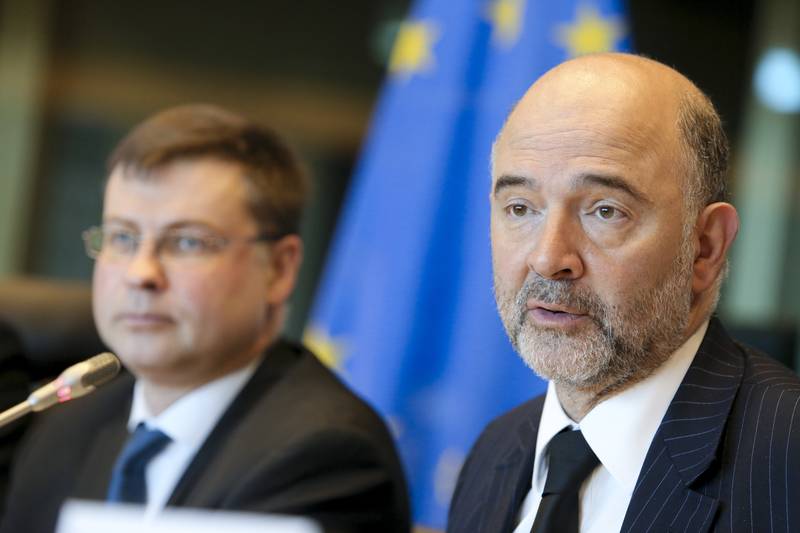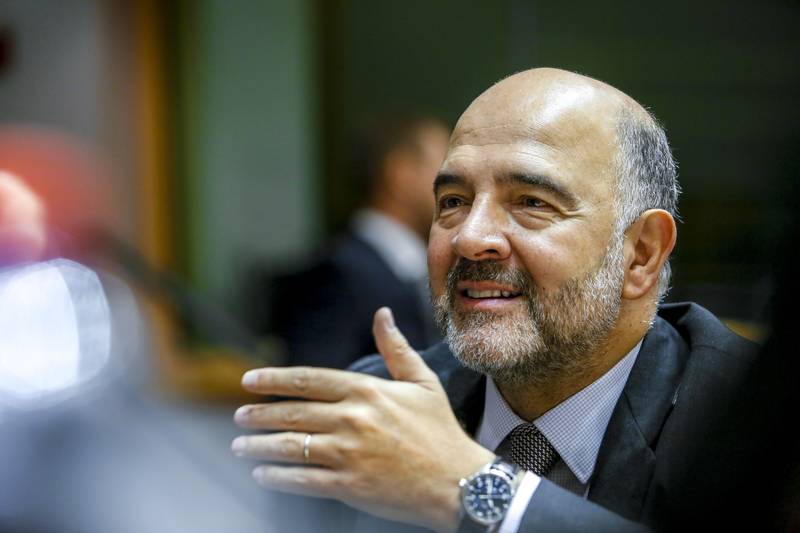The Deepening of Euro Area Integration - Let's Not Put the Cart Before the Horse
Adelina Marini, September 23, 2015
 The political autumn has begun with a flying start in the EU with the first serious discussions on the future of the euro area, sketched in the five presidents’ report, presented for the first time at the June summit. Preliminary expectations were that the report will drown in the myriad of other problems that the EU is facing at the moment, but after the Greek crisis brought on serious discussions of a GRexit member states finally agreed that this has gone far enough. The report was discussed for the first time by the EU finance ministers at their informal meeting in Luxembourg on September 11-12 and after that in the EP’s economic committee. Both discussions highlighted a convergence between the so far conflicting dominant ideas – going towards deepening through institutional development on one hand and on the other – full implementation of current legislation before considering any changes.
The political autumn has begun with a flying start in the EU with the first serious discussions on the future of the euro area, sketched in the five presidents’ report, presented for the first time at the June summit. Preliminary expectations were that the report will drown in the myriad of other problems that the EU is facing at the moment, but after the Greek crisis brought on serious discussions of a GRexit member states finally agreed that this has gone far enough. The report was discussed for the first time by the EU finance ministers at their informal meeting in Luxembourg on September 11-12 and after that in the EP’s economic committee. Both discussions highlighted a convergence between the so far conflicting dominant ideas – going towards deepening through institutional development on one hand and on the other – full implementation of current legislation before considering any changes.
A new euro area by 2025
Ministers of finance devoted most of their time exactly on discussing the presidents’ report and in the words of Pierre Gramegna, Minister of Finance of Luxembourg, the debate went on for almost three hours. An agreement was reached that the final deadline for finalising the deepening of the Economic and Monetary Union should be the year 2025. Moreover, it was agreed that the two phases should go parallel. This means that while working on short-term measures for lowering risk to the euro area there should be a discussion going on sharing the risk. As Pierre Moscovici (France, Socialists and Democrats) explained later in the economic committee of the EP, while working on the implementation of current legislation, national discussions should start in the member states on long-term goals. These include new institutions and additional sharing of sovereignty.
An important part of the Finance Ministers’ discussions was the talk on balance between members of the euro area and the countries outside it. In the words of Minister Gramegna there were many good contributions from non-members, some of which have no intention of accepting the euro. “We listened very carefully and we also understood the necessity to improve the dialogue,” he said. Ministers gave the task to the EC to come up with a road map for working on the first phase. Vice President of the EC in charge of the euro area Valdis Dombrovskis (Latvia, EPP) announced that the EC will be ready with the time line by mid-October. He coined a new name for the first phase in the typical Brussels slang – “deepening by doing”. The hidden meaning behind this phrase is deepening though implementation of existing legislation.
According to Mr Dombrovskis the EC will continue working on the improvement of the European semester. A process that began last year and to this point has dubious effect. In his words, the focus will shift towards the largest social-economic challenges that member states are facing. For this purpose a board of fiscal advisers will be constituted which will coordinate the work of national fiscal councils, whose creation was agreed on in the fiscal pact. Furthermore, the creation of a network of national competitiveness bodies is forthcoming, whose mandate will be monitoring wage and competitiveness levels in member states. Valdis Dombrovskis underlined that this successive attempt at deepening of integration in the euro area will be successful only if a balance is kept between responsibility and solidarity.
A part of the first phase is the completion of the banking union, which lacks the third element – a common deposit guarantee scheme. On this point, however, there are serious disagreements between member states. As the Luxembourg minister of finance said, “let's not put the cart before the horse”. He added that there is readiness among the ministers for such a system, but it must be a sequence to risk-sharing. And sharing more risk is only possible after everything has been done to minimise it. This means member states are to follow EC guidelines, fiscal and economic rules. Something that has slacked off with the EC’s new “political” approach. Despite strong opposition by certain member states, headed by Germany, Commission President Jean-Claude Juncker announced in his State of the Union address that the EC will present a proposal for such a scheme by the end of the year.
 His vice-president Dombrovskis clarified that this will happen in the second half of October, but promised that before drafting the proposal the EC will consult member states. Benoît Cœuré, member of the Executive Board of the European Central Bank (France), in turn stated that there was wide consensus between ministers that first of all the Bank Recovery and Resolution Directive must be fully implemented before thinking of anything else. In the context of the banking union there was a discussion on the single resolution fund that is supposed to start working on January 1st, but is still not ratified by all member states. Valdis Dombrovskis said that, although the goal is for the fund to be financed gradually by the banking sector, at the moment there is a need to provide temporary financing, while a decision is made for its financial backing.
His vice-president Dombrovskis clarified that this will happen in the second half of October, but promised that before drafting the proposal the EC will consult member states. Benoît Cœuré, member of the Executive Board of the European Central Bank (France), in turn stated that there was wide consensus between ministers that first of all the Bank Recovery and Resolution Directive must be fully implemented before thinking of anything else. In the context of the banking union there was a discussion on the single resolution fund that is supposed to start working on January 1st, but is still not ratified by all member states. Valdis Dombrovskis said that, although the goal is for the fund to be financed gradually by the banking sector, at the moment there is a need to provide temporary financing, while a decision is made for its financial backing.
According to the Bulgarian Ministry of Finance, the fund should be granted a direct credit line from the European Stability Mechanism (the euro area’s permanent bailout fund), for this would guarantee “equivalency” between members of the banking union within the euro area and outside it.
When will treaties be amended?
Regarding the second phase of the euro area deepening, Valdis Dombrovskis said in front of MEPs that an expert group is being set up to reflect on the second stage. The EC intends to prepare a White Paper on the second stage by 2017. Pierre Moscovici added that the second stage will be the real deepening of the euro area when it will become political. Something that surely calls for treaty change, but neither him nor Mr Dombrovskis could commit to a time when there could possibly be talk of opening the treaties for alterations. And if the atmosphere at the finance ministers’ meeting looked to be positive and constructive, the report was met with hostility by all sides in the EP’s economic committee – both the ones that are against the deepening of European integration and the ones advocating federalisation.
Curiously, there was a convergence of positions on a national basis between members of groups that differ in beliefs. Germans Markus Ferber (EPP) and Bernd Lucke (ECR) expressed in practise the position of German Finance Minister Wolfgang Schäuble. Mr Ferber announced that the report pools the risks and makes them communal. “Should we not concentrate more on what was already agreed?” Bernd Lucke in turn expressed a direct concern that the direction is towards a “big transfer union”. He insisted on getting some answers to the many questions brought up by the idea of the report for the creation of a European Finance Minister. During the debate a quarrel broke out between him and other MEPs, who attacked Pierre Moscovici and Valdis Dombrovskis for not having answers to these important questions, which are, however, entirely in the second stage of euro area deepening, on which no concrete proposals are made yet.
The groups on the left side of the political spectrum, which as a rule advocate for more-community solutions, also criticised the report, but for not being brave enough. Philippe Lamberts (Greens, Belgium) threatened that without a mechanism for financial solidarity the euro area is doomed. Pervenche Berès (Socialists and Democrats, France), a rapporteur exactly on the future of the euro area, criticises the idea for the creation of two new agencies – the board of fiscal advisers and the competitiveness agency. She thinks there is no need for new  institutions, but for euro area management and a common deposit guarantee scheme.
institutions, but for euro area management and a common deposit guarantee scheme.
Bulgaria is cautious in its position, Croatia is more straightforward
The Bulgarian position on the report is linked mainly to keeping the balance between members of the euro area and non-members. According to the Ministry of Finance, euro area deepening measures should not lead to greater division between members and non-members. Similar to the British position, Bulgaria also insists on preserving the integrity of EU28. Sofia’s view is that the common market is a major priority to Bulgaria.
Croatia is keeping a close eye to developments in the euro area, for the country is highly euroized, explained in an interview for euinside the chairman of the European Affairs Committee of the Croatian Parliament, Daniel Mondekar (Social Democratic Party). In his opinion, a deepening of the euro area integration will solve its problems, for “it [deeper integration] finally teaches you that countries are not islands, which are not affected by anything happening outside them. The deeper integration will have that butterfly effect, which could really, if there are able and responsible politicians, have a multiplied effect on a state level”. He feels, however, that opening the treaties to changes is opening Pandora’s box. Many things could be done without changes in the Treaty of Lisbon. Even British demands could be addressed without changes.
Translated by Stanimir Stoev
 Angela Merkel, Emmanuel Macron | © Council of the EU
Angela Merkel, Emmanuel Macron | © Council of the EU Benoit Coeure | © Council of the EU
Benoit Coeure | © Council of the EU Pierre Moscovici | © Council of the EU
Pierre Moscovici | © Council of the EU